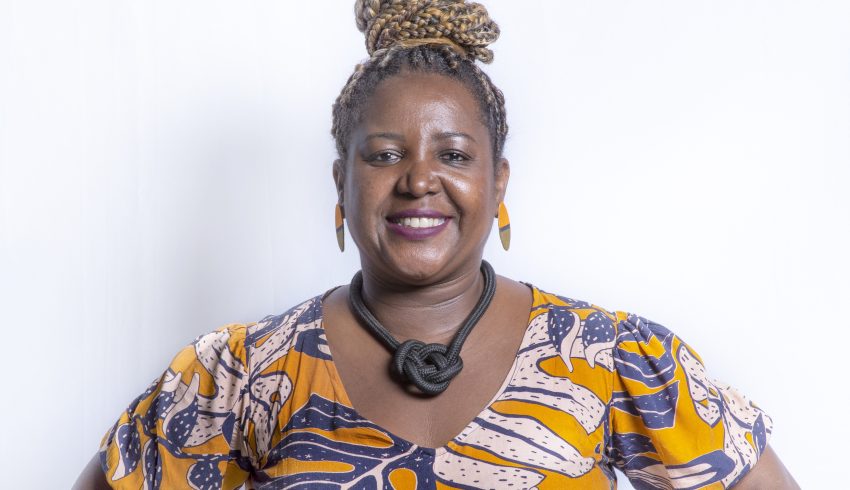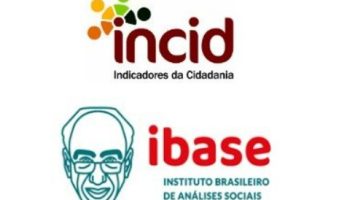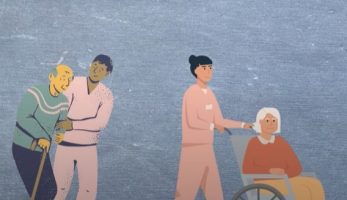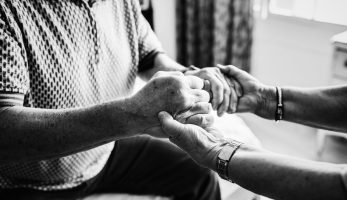Testimony by Vanessa Regina Ribeiro de Oliveira dos Santos (41)
Mother of Igor Vinícius, 24, Eduardo Vinícius, 20, and Julia Regina, 12
“October 27 2019 was one of the most exciting days of my life. On the screen of the Fundação Nacional do Livro Infantil e Juvenil (National Foundation for Children and Youth Books), about three meters high, there was a sign ‘Relatos de aventuras de Apoio de Leitura’, my name and, next to it, ‘social entrepreneur’.
I remember that, on that day, getting to the Foundation was difficult. I had to hop on the BRT [a type of public transport in Rio de Janeiro] without paying for the ticket, and I only had cookies in my pocket to eat — and I hate cookies. But seeing my name there on the screen, all the difficulty I had gone through gave way to another memory. ‘Auntie, how beautiful this place is’, said one of the children helped by our project. The library was under construction, and all I could see was dust, rubble, and delays. I asked what he was seeing. ‘I can see a beautiful library.’ He saw the power of that space.
I often say that children restore our hope, and that’s what happened that day. I saw my name on the screen and was able to see the beauty that the boy had seen in that unfinished work. We completed the work a month later, all done with donations, and opened the Ler e Saber headquarters and the library project: Community Library Professora Maria da Graça Soares Valente, Tia Graça. The name is a tribute to a teacher of mine when I was a child, who gave me the book A Bolsa Amarela, by Lygia Bojunga, and awakened in me a passion for reading. Sometimes, inside the whirlwind of life, we simply can’t see the inherent beauty of things.
When I arrived at the Dara Institute in 2010, I was in turmoil. I didn’t recognize myself. I was unemployed—I had had a great job—with two teenage children and a baby with a respiratory illness that no one had diagnosed. I was completely overwhelmed and defeated. Anyone who sees the photos that the team at the Dara Institute took when I arrived here cannot believe it. I was completely lost, smiling but with sad eyes. I couldn’t see the bright side of everyday family things. Everything was negative to me, even living with the children. The Institute helped me to regain my identity and, as a result, to reconnect with the people I loved the most. It was a very difficult time, in which I had to rediscover myself as a person. I just thought, ‘I’m fat, my hair is a mess and my husband doesn’t love me anymore. I just carry my unborn daughter and I can’t take care of my kids anymore, I don’t even want to get out of bed’. Dara’s psychologist helped me understand that all was not lost, that there was a way forward and that I needed to take care of myself. At the same time, I learned from the teams in other areas to take care of myself and make healthier choices for meals at home. We also received support with special milk for the baby, medication and an allowance for food.
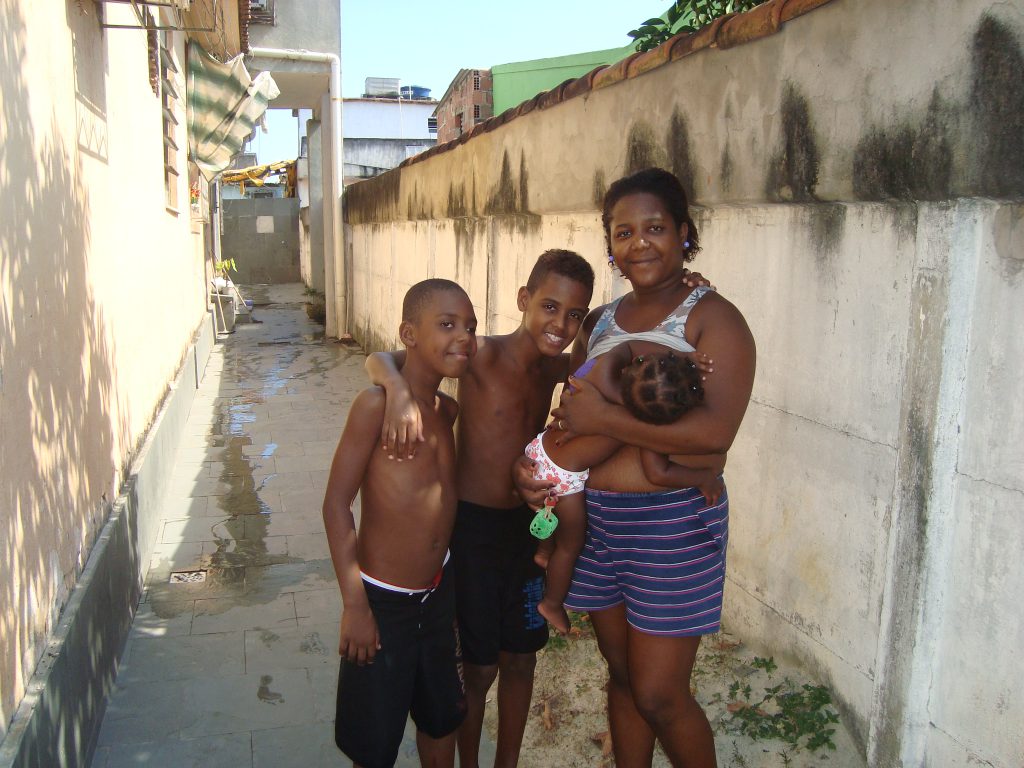
‘What are you doing to change the situation you are in?’ was the question that changed my life. That completely messed with me, because I immediately complained, almost by nature, but didn’t do anything to change anything. How could I want something new to happen if I wasn’t doing my part? I understood that I had to treat my mind and attitude. I was feeling unworthy of sending a resume. I couldn’t remember the last time i had written and sent one.
People are raised to be poor in favelas. My mother made an absurd effort for us to study and understand each other as citizens. But in the maelstrom, I completely forgot about it. When I got healthy, I became more patient, I went back to being the loving person I used to be, taking care of my home, my appearance. I slowly went back to doing things for myself, breathing before speaking and had more patience to listen. Then everything started to improve. I needed someone to listen to me, and I got it at the Dara Institute. The day I understood that I needed to pursue my rights, but that I also had to act in order to do so, I had my duties. Things began to change the day I understood that I needed to do my part.
My perspective has changed, and so has my children’s. My son helped me put together a resume. Some time later, I went on my first job interviews. Soon after, a photographer friend showed my resume at the agency where he worked and arranged an interview for me. It was in Urca, in the South Zone of Rio de Janeiro, and it was a mansion! ‘No, I can’t,’ I said. I didn’t feel up to it, the work required knowledge that I didn’t have. My friend replied: ‘You will, because I’ve already scheduled the interview, if you don’t turn up it will be so bad for me’. I was really scared, nervous. At the end of the day, they called me: ‘Can you start tomorrow?’
That was a turning point in my life, because the salary was good, I had health insurance for me and my children and food and meal vouchers. And I loved working there. In two months, when things stabilized again, I returned to Dara to cancel the basic food basket and milk cans, so they could help another family. I was left with the medicines, which were still very expensive, until the day I was discharged.
Since then, I have discovered myself as an educator and entrepreneur.
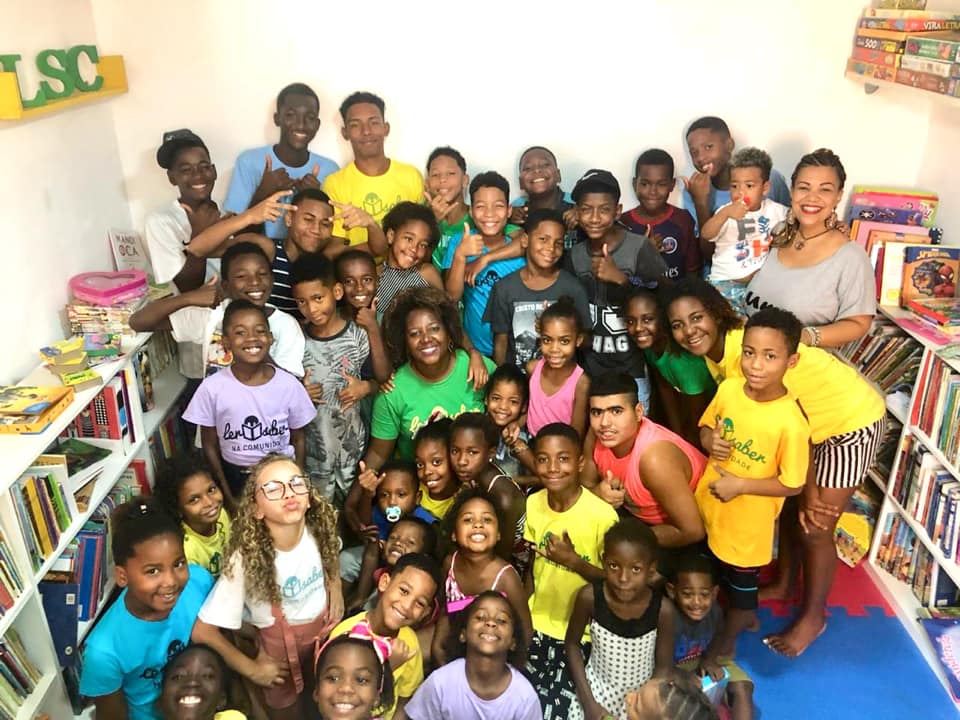
Today I dedicate my time to the NGO I created in the community where I was born, in the Congonha favela, in Madureira, North Zone of Rio. In 2015, I founded Ler e Saber na Comunidade, a project to encourage reading, access to children’s books and a community library.
We have a dream, which is to tell the story of the Congonha favela, where our project is located. Because it is a community almost invisible to society, it only appears on the news when a tragedy occurs, like the one in 2014. Congonha’s name appeared in the newspaper because a woman, Cláudia, a general service assistant, was shot by the police and, later, rescued by a police vehicle, ended up getting her clothes caught in the door and was dragged along the asphalt for at least 350 meters. It is through stories like these that people hear about Congonhas, and we want to change that.
I work with children and adolescents, but also with mothers. And I use my experience with the Dara Institute as inspiration. In conversation circles, such as Aconchego do Dara [dialogue and listening activity with the families served], I encourage the empowerment of these women in all areas, so that they return to the job market, to study, and to have, yes, a companion, but not someone who abuses her. I want to pass on a little of what the social worker and the psychologist said to me, and with these tools, I want to bring about change.
At the Dara Institute I learned to respect processes and transform lives, not just to help. We are not welfare, we are a cultural association, which has art, which has a library. And the collection there is not mine, it is available to the community. Today, we have 5,000 books cataloged and many still in boxes. And we offer four activities in addition to book loans: reading mediation, a braiding workshop, dance class and an audiovisual workshop for teenagers. I want people to see the institution as a little piece of their home.”
In 2022, we organized a joint effort with graffiti artists on the street that leads to the Ler e Saber library so that they could see from afar that a cultural project was operating there. It was such a beautiful Sunday, I cried a lot. I have never seen the community as mobilized as it was that day. Everyone took part, offering the walls of their houses to paint, coffee and water. And the children were the artists’ little helpers.
I am very proud to be recognized in my community as an agent of culture, a mobilizer, and not just as “Aunt Vanessa”. I have lived in this community for over twenty years and I haven’t seen anything change. With the arrival of Ler e Saber in this community, we have transformed so many lives. And more is to come.”
